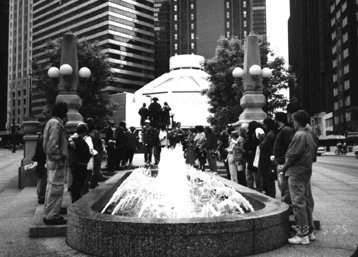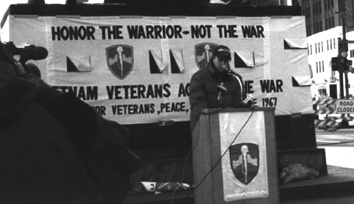 |
Social Justice Activism: No Generational BoundariesBy Brooke Anderson
Good morning. My name is Brooke Anderson. I am a 19-year-old junior at the University of Illinois at Urbana-Champaign. Born more than a decade after the founding of VVAW, I'm somewhat disadvantaged with respect to being able to speak about veterans' issues. But what I do know is that my life, and the lives of many of my fellow student activists, have been profoundly and forever changed by the friendship and leadership of Vietnam Veterans Against the War. It is about this relationship between VVAW and student activism that I will speak to today. I was introduced to VVAW through my work with the Progressive Resource/Action Cooperative (PRC) - a multi-issue, multi-tactical activist organization in Champaign-Urbana, Illinois working for peace with justice, and currently spearheading the movement to eliminate "Chief Illiniwek" as the racist mascot and logo of the University of Illinois. Through working with the PRC, I became acquainted with several VVAW members that I now consider my dear friends: Jim Holiman, Joe Miller, Jeff Machota, Claudia Lennhoff, Lisa Dixon, and later Barry Romo and Bill Branson who dedicated countless hours to training security volunteers for the numerous demonstrations and marches we have every year as well as for the national Conference on the Elimination of Racist Mascots (CERM) we hosted in April. Since then, student activists have attended the VVAW regional and national meetings, volunteered at the Summer 1998 Homeless Standdown, camped out with vets and friends this summer and fall, attended various VVAW parties, and contributed to the VVAW paper, The Veteran. In all the time we've spent together, storytelling has become an important activity. Listening to the stories of veterans and their allies, their pain is sometimes tangible and one cannot but experience it as one's own. It can be a healthy pain though, like that of a hand or a foot to which blood is returning after having fallen asleep, a signal that something is wrong, that action is needed. But accompanying this pain is often confusion: a disturbance of, and challenge to, a once-coherent and comforting world view, now seething with hypocrisy and contradiction as we realize that the economic, social, and political systems that created the Vietnam War still exist today. The U.S. government continues to brutally crush liberation movements in other countries and within our own. It denies the right to self-determination and supports dictatorial regimes, even providing arms, economic aid, and military training to such regimes. It ravages the environment, and with it, often the only means of subsistence for many indigenous populations. This same government of ours creates and perpetuates an environment in which women are raped and people who identify as lesbian, gay, bisexual, or transgendered are beaten. Meanwhile, our leaders and our heroes waste away as political prisoners in maximum security prisons. Moreover, it lets its veterans starve and freeze on the streets, go without proper medical care, and fail to adequately provide for their families.
At 19, I've still got a lot of growing up to do, but if I have anything to do with it, I'm not going to grow up in such a world without trying to change the domestic social, political and economic institutions that perpetuate war. Why? As Martin Luther King, Jr. once said, "Injustice anywhere is a threat to justice everywhere. We are caught in an inescapable network of mutuality, tied in a single garment of destiny." Recognizing such interdependence of oppressions, the student movement and the veterans' movement have much to learn from each other and much to struggle for together. Over the past year, I've seen a kind of cross-pollination between the student and veterans' movements. VVAW has provided leadership, friendship, historical perspective, advice, and inspiration to the next generation of student activists - most of this over beer, no less! VVAW leaders have brought out the best in student activists by simply refusing to see anything but the best in us. As Nelson Mandela said, "As we let our own light shine, we unconsciously give other people the permission to do the same. As we are liberated from our own fear, our presence automatically liberates others." In return, students have contributed to VVAW a contagious energy and vitality. Together we have reaffirmed our commitment, our vision, and our sense of community within our respective movements. As students, we recognize that universities are not autonomous institutions, but rather serve the interests of capitalist, racist, sexist, heterocentric military-industrial complex we call the United States of America. Even worse, rationales for maintaining such an order are created within these universities - within our own political science (except Joe's!), philosophy and history classes. Therefore, if we students are to effect change within the university system, we must also engage in struggle to fundamentally alter society at large. To do this we need to nurture a collective memory of resistance movements, their successes and mistakes, and also of their state suppression. The way in which Vietnam is remembered will in part determine the way in which my generation and generations to come will react to war, and hopefully resist it with everything we've got. This is especially important because those individuals and institutions responsible for war and injustice are trying to get us to forget about something that, if we remembered, would get them in some serious trouble. Let me repeat that: your government, our government, is trying to get us to forget something - the real history and lessons of the Vietnam War and the lies they told about it. They're trying to get us to forget the lessons of the anti-war movement, the history of resistance within the United States and the world over, of people struggling to be free. We're supposed to forget this rich history of resistance because they know that if we remember, then we will ensure that there will never be another Vietnam War, there will never be another Wounded Knee, there will never be another Counter Intelligence Program, there will never be another Gulf War - not if we can help it! We have a right to be free, to be educated, to do meaningful work, to have decent health and child care. We have a right to sexual equality, to love whomever and however we choose, to leave a healthy planet for our children. We have a right to demand justice, to demand that our histories not be rewritten and revised by those who murdered for profit.
In the age of globalization, it is easy to feel powerless. And that's no mistake - the system is set up to disempower, to create the illusion that change is hopeless, that with their media, their money, and their legal system, that somehow we're stuck with the status quo. But that's not power. Power is about being able to translate a perception of social injustice - that sickening feeling you get watching the evening news, that anger at being witness to brutality - translating that into a program of action. It's about compassionate, searching minds. It's about people acting in solidarity to promote justice. And it can't fail because you can't arrest, imprison, or kill an instinct for justice, and this is exactly what has been nurtured by the symbiotic relationship between VVAW and the next generation of student activists. The best way to honor the sisters and brothers we've lost in struggle is to continue to work for justice. I think it goes something like: "Remember the dead, and fight like hell for the living." As students involved in VVAW, we are here to bear witness, to become part of what we have learned, and to speak to power those truths which you have imparted to us, and we will continue to do so and to tell your stories long after you are gone! Brooke Anderson is a junior at the University of Illinois. She currently works with the Progressive Resource/Action Cooperative in the struggle to eliminate "Chief Illiniwek" as the racist mascot and symbol of the University.
|



